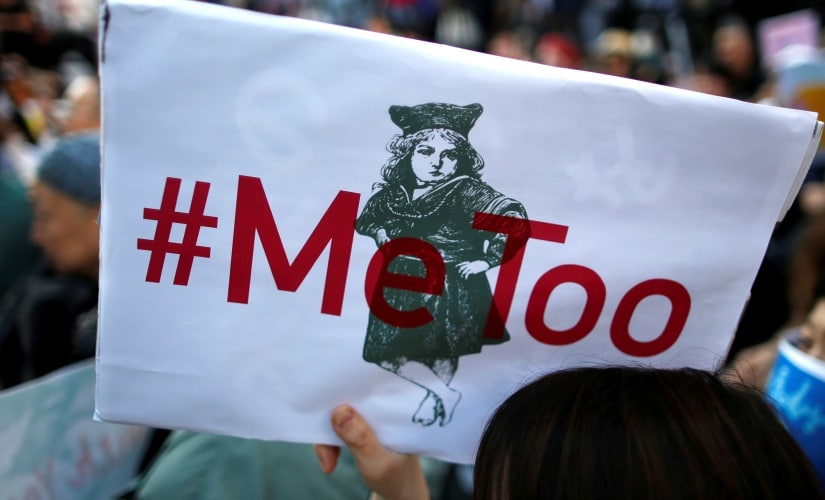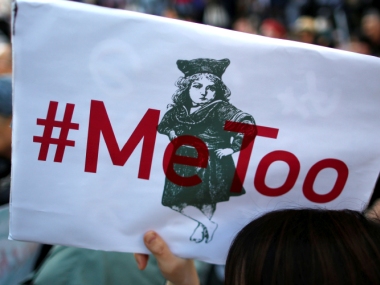Yesterday morning I streamed a video in which NDTV anchor Nidhi Razdan led a panel called From Bollywood To World Of Comedy: Why #MeToo Complaints Are Unanswered? then opened Twitter to find a tweet by her quickly going viral: “Some jerk you met on a date or some creep in the office who tried to get too close, doesn’t qualify as sexual harassment. Unless the person didn’t back off when you said NO, please don’t trivialise what women are going through with sexual predators esp at work."
Apart from lacking nuance entirely, this is a dangerous opinion to voice without context and an irresponsible misuse of clout. Why are we collectively hashtagging #believewomen but adding the disclaimer unless ‘it’s insignificant’? The tweet ironically trivialises the harassment women endure every day. There is no such thing as not creepy unless you said no. On Twitter, I have been keeping track of
the stories
coming out
about harassers
and their predatory behaviour over the last few days. Some are terrifying examples of violent sexual assault, some are ‘more palatable’ — workplace propositions, solicitations, sending or demanding nudes. Most live in the middle of the sexual harassment spectrum. As I began collating names, I made the decision not to gatekeep the stories as long as they named names and stated the unwelcome behaviour. [caption id=“attachment_5334151” align=“alignnone” width=“825”]
 #MeToo. Reuters/Issei Kato[/caption] Today, three days after the outpouring began, in addition to Razdan’s tweet, my replies are filled with people dismissing claims. “This is flirtation.” “This is a bad date.” “A misunderstanding.” “A hookup gone wrong.” How, one account asks, do we know the difference? Consent. True consent is enthusiastic, ongoing, active. Most importantly, mutual. None of the men named seemed to understand that. In the thread are accounts of men unable to read the room or unable to take no (even repeated ones) for an answer. There are instances of men abusing their authority, of them stalking women, or taking a previous instance of consent as a continued right to access. Almost a dozen men in the thread have been called out by multiple people. Women may have the agency to say yes but plenty don’t have the ability and privilege of saying no. It’s important to note the power dynamic in many of these stories is not horizontal. Women are all too aware of the repercussions of rejecting men, from being denied opportunities in the workplace, made social pariahs to violence and murder. Since the
Kafila letter
in response to LoSHA, there’s been a pattern of older feminists attempting to try and silence women or minimize their trauma, when speaking up is the only form of justice most of us are able to experience. Many of these due process champions use illegal as a parameter for unacceptable, an opinion they share with thousands of right-wing trolls in my mentions.
#MeToo. Reuters/Issei Kato[/caption] Today, three days after the outpouring began, in addition to Razdan’s tweet, my replies are filled with people dismissing claims. “This is flirtation.” “This is a bad date.” “A misunderstanding.” “A hookup gone wrong.” How, one account asks, do we know the difference? Consent. True consent is enthusiastic, ongoing, active. Most importantly, mutual. None of the men named seemed to understand that. In the thread are accounts of men unable to read the room or unable to take no (even repeated ones) for an answer. There are instances of men abusing their authority, of them stalking women, or taking a previous instance of consent as a continued right to access. Almost a dozen men in the thread have been called out by multiple people. Women may have the agency to say yes but plenty don’t have the ability and privilege of saying no. It’s important to note the power dynamic in many of these stories is not horizontal. Women are all too aware of the repercussions of rejecting men, from being denied opportunities in the workplace, made social pariahs to violence and murder. Since the
Kafila letter
in response to LoSHA, there’s been a pattern of older feminists attempting to try and silence women or minimize their trauma, when speaking up is the only form of justice most of us are able to experience. Many of these due process champions use illegal as a parameter for unacceptable, an opinion they share with thousands of right-wing trolls in my mentions.
)